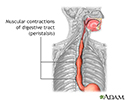Peristalsis
Intestinal motility
Peristalsis is a series of muscle contractions. These contractions occur in your digestive tract. Peristalsis is also seen in the tubes that connect the kidneys to the bladder.
Peristalsis is an automatic and important process. It moves:
- Food through the digestive system
- Urine from the kidneys into the bladder
- Bile from the gallbladder into the duodenum
Peristalsis is a normal function of the body. It can sometimes be felt in your belly (abdomen) as gas moves along.
References
Hall JE, Hall ME. General principles of gastrointestinal function - motility, nervous control, and blood circulation. In: Hall JE, Hall ME, eds. Guyton and Hall Textbook of Medical Physiology. 14th ed. Philadelphia, PA: Elsevier; 2021:chap 63.
Merriam-Webster's Medical Dictionary. Peristalsis. www.merriam-webster.com/medical. Accessed July 18, 2022.
Digestive system - illustration
Digestive system
illustration
Ileus - X-ray of distended bowel and stomach - illustration
Ileus - X-ray of distended bowel and stomach
illustration
Ileus - X-ray of bowel distension - illustration
Ileus - X-ray of bowel distension
illustration
Peristalsis - illustration
Peristalsis
illustration
Digestive system - illustration
Digestive system
illustration
Ileus - X-ray of distended bowel and stomach - illustration
Ileus - X-ray of distended bowel and stomach
illustration
Ileus - X-ray of bowel distension - illustration
Ileus - X-ray of bowel distension
illustration
Peristalsis - illustration
Peristalsis
illustration
Review Date: 7/25/2022
Reviewed By: Linda J. Vorvick, MD, Clinical Professor, Department of Family Medicine, UW Medicine, School of Medicine, University of Washington, Seattle, WA. Also reviewed by David C. Dugdale, MD, Medical Director, Brenda Conaway, Editorial Director, and the A.D.A.M. Editorial team.







